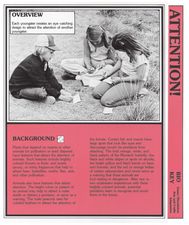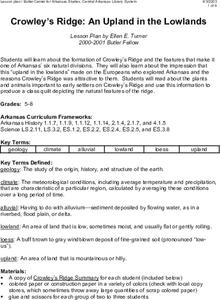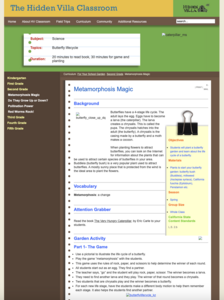Curated OER
Attention!
Second graders observe the colors that attract animals in nature. In this features lesson, 2nd graders find ways animals are attracted to plants other than color. Students create an illustration of these sensory attractions.
Scholastic
Study Jams! Magnetism
Six simple images pull your class into magnets. Most of the pictures show magnetic fields as revealed by iron filings. Concepts are explained in print along the bottom of each slide and include magnetic force, force fields, poles,...
Curated OER
Scenic Attractions in Four Corners
Fourth graders find and list scenic attractions in SE Utah and the Four-Corners-region. They identify geographic characteristics of Utah and other states in the western region of the United States. They review cardinal directions and...
American Museum of Natural History
What's This? Reproduction
Attracting the right mate is as important for humans as any other species. An interesting lesson teaches individuals about several strategies that animals and plants have adapted to attract their mates. From colorful nests to powerful...
Curated OER
The Producers
Students design attractive posters to promote the work of Leroy Anderson, an American composer with an unusual style.
Curated OER
Crowley's Ridge: An Upland in the Lowlands
This clever lesson combines elements of geography, art, literature, and storytelling. Pupils take a close look at the six geographical regions of Arkansas, and pay close attention to Crowley's Ridge - which is one of the six. In groups,...
University of Wisconsin
Getting the Word Out
An appropriate way to celebrate and conclude the construction of a rain garden is to share it with the community. Small groups collaborate to design an outreach product such as a PowerPoint presentation, brochure, or poster, to draw...
Central Oregon Community College
Things Fall Apart Study Guide
“There is no story that is not true.” And Chinua Achebe’s Things Fall Apart, uses proverbs (“. . .the palm-oil with which words are eaten”), a compelling tragic hero, and historic events, to engage readers in the truth of his story of...
Bowels Physics
Magnetic Fields and Forces
Every knows that opposites attract! Here's a presentation that uses this background knowledge to explain magnetic fields and forces. The resource also explains the shape of magnetic fields and how to determine the direction of forces.
University of North Carolina
Working with Your International TAs
Colleges and universities attract a diverse group of pupils, and sometimes that includes teaching assistants (TA) from other countries. Using a handout on working with international TAs, scholars find tips to use when listening and...
American Museum of Natural History
Beyond T. Rex
Some dinosaurs get all the attention. Pupils use an interactive resource to study some of the lesser-known dinosaur species. Organizing the information in a cladogram allows learners to make connections among the species.
Curated OER
Magnets
Second graders participate in a teacher demonstration of the polarity of magnets. They observe how magnets repel and attract items before drawing their observations on worksheets. They manipulate the donut magnets, discuss their action...
Curated OER
How is Lightning Formed
Learners research lightning paying particular attention to how it is formed, where it is most likely to occur, and how most people struck by lightning survive.
Curated OER
Meaty Words
Headlines from newspapers launch a discussion of image-rich, meaty words. Just as headline writers choose vivid vocabulary to attract readers, young writers develop headlines that capture the essence of a passage from a book they are...
Curated OER
Scenic Attractions In Four Corners
Fourth graders find and list scenic attractions in SE Utah and the Four-Corners-region. They receive direct instruction and carry out activities in cooperative group settings. They combine their findings onto one large map at the end of...
J. Paul Getty Trust
Tag: Whose Values
Get young people thinking about their lives and current topics of social justice, advocacy, gender, race, and identity. After examining several works by Barbara Kruger, participants select a tag with one of the questions printed on it,...
Curated OER
Metamorphosis Magic
Students play rock-paper-scissors and create a play to demonstrate the butterfly life cycle. In this butterfly life cycle lesson plan, students also plant a butterfly garden with plants that attract butterflies.
Curated OER
Comparing the Amoeba to Paramecium
This laboratory activity is valuable practice in comparing features of different organisms. You could use it to introduce junior biologists to protozoans. The materials and procudures for the learners are simple, and analysis questions...
Curated OER
Natural Resources: Can We Use Them Forever? Grade 2
Bright colors and animation are great ways to attract a young students attention. Students are introduced to the concepts of renewable and non-renewable resources as they pose the question, will our resources be around forever? This...
Curated OER
Magnetic Pick-ups
Students investigate the push and pull of magnets. In this magnetics lesson, students are introduced to the idea that there are forces that happen on earth which cannot be seen, such as electrically charged objects, magnetic force...
Curated OER
Magnetic Pick-ups
Students gain an understanding that certain materials are attracted to magnets and some are not.
American Museum of Natural History
Feed the Birds
Scholars use a large carton, string, an emery board, and bird food to create a hand-made bird feeder. After completing the craft, pupils keep a journal to track their observations.
K12 Reader
Natural Resources
What natural resources are available in your area? Your learners can consider this question after reading a brief passage about natural and renewable resources. After reading, class members respond to five questions related to the reading.
Curated OER
Magnetic Discovery Bottle
Students examine how to conduct simple investigations and use simple equipment to gather data. In this magnet lesson students decide what types of objects are attracted to magnets.

























